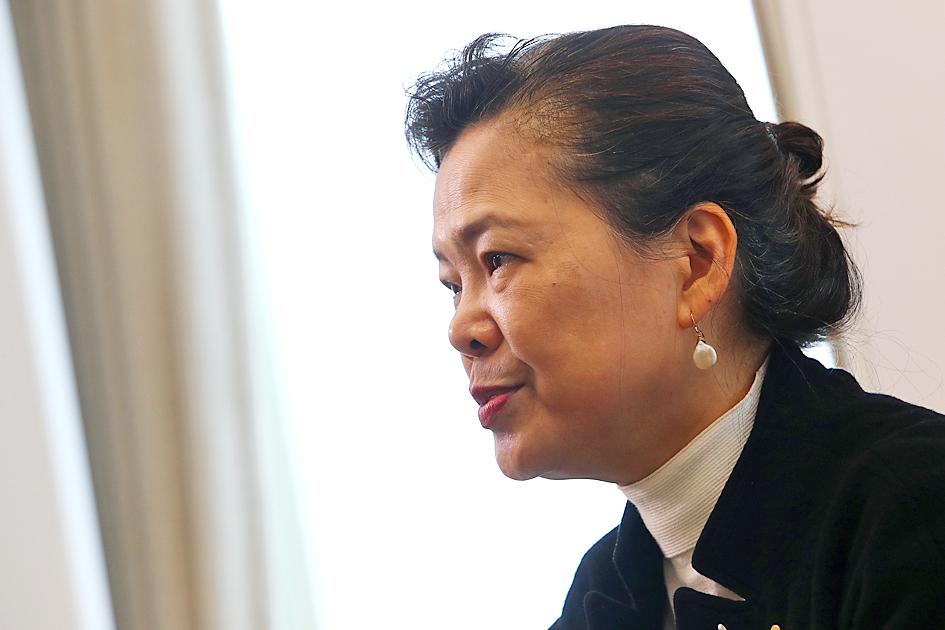The Ministry of Economic Affairs (MOEA) yesterday announced a new regulation to protects people from purchasing defective vehicles.
“This is an extra layer of protection for consumers,” Minister of Economic Affairs Wang Mei-hua (王美花) told a news conference in Taipei.
“Unlike previous efforts, this protection will be written straight into law,” she said, referring to the Mandatory and Prohibitory Provisions of Standard Contracts for Sales of Mobile Vehicles (汽車買賣定型化契約應記載及不得記載事項).

Photo: CNA
Under the amendments, if a new vehicle or a vehicle under 6 months old with less than 12,000km on the odometer catches fire, the owner has the right to exchange it for another vehicle of the same model, or get their money back.
If other serious defects, such as unexpected acceleration, brake failure, engine overheating or other “defects that potentially threaten life and health” occur and persist after two repairs, the new regulation also applies, the ministry said.
The new regulation also applies to vehicles with less serious defects that persist after four repairs, if the repairs leave the owner without a vehicle for more than a month, it said.
The new regulation will go into effect on July 1, Wang said.
Separately, Wang expressed the hope that Taiwan could participate in a “chips for vaccines” scheme, which was suggested by the Taiwan Institute of Economic Research, to help Taiwan obtain COVID-19 vaccines in exchange for certain automotive chips, which are in short supply on the global market.
“Under the difficulties of the COVID-19 pandemic, we all have to support each other as much as we can,” Wang said. “We are willing to do our best to provide the world’s auto industries.”
Wang said that she has spoken to German Institute Taipei Director-General Thomas Prinz about the possibility of Germany helping Taiwan obtain vaccines.
On Wednesday, Wang received a letter from Prinz seeking help to resolve the chip shortage, she said.
“Yesterday I told Prinz that we are trying to help solve the problems of the automotive industry. Of course we hope they can help us with vaccines, especially for our medical staff,” Wang said. “Prinz will forward our request to the German government.”
Asked whether there would be further attempts at “chip diplomacy,” she said that the ministry is approaching the issue “one thing at a time.”

TAKING STOCK: A Taiwanese cookware firm in Vietnam urged customers to assess inventory or place orders early so shipments can reach the US while tariffs are paused Taiwanese businesses in Vietnam are exploring alternatives after the White House imposed a 46 percent import duty on Vietnamese goods, following US President Donald Trump’s announcement of “reciprocal” tariffs on the US’ trading partners. Lo Shih-liang (羅世良), chairman of Brico Industry Co (裕茂工業), a Taiwanese company that manufactures cast iron cookware and stove components in Vietnam, said that more than 40 percent of his business was tied to the US market, describing the constant US policy shifts as an emotional roller coaster. “I work during the day and stay up all night watching the news. I’ve been following US news until 3am

UNCERTAINTY: Innolux activated a stringent supply chain management mechanism, as it did during the COVID-19 pandemic, to ensure optimal inventory levels for customers Flat-panel display makers AUO Corp (友達) and Innolux Corp (群創) yesterday said that about 12 to 20 percent of their display business is at risk of potential US tariffs and that they would relocate production or shipment destinations to mitigate the levies’ effects. US tariffs would have a direct impact of US$200 million on AUO’s revenue, company chairman Paul Peng (彭雙浪) told reporters on the sidelines of the Touch Taiwan trade show in Taipei yesterday. That would make up about 12 percent of the company’s overall revenue. To cope with the tariff uncertainty, AUO plans to allocate its production to manufacturing facilities in

Six years ago, LVMH’s billionaire CEO Bernard Arnault and US President Donald Trump cut the blue ribbon on a factory in rural Texas that would make designer handbags for Louis Vuitton, one of the world’s best-known luxury brands. However, since the high-profile opening, the factory has faced a host of problems limiting production, 11 former Louis Vuitton employees said. The site has consistently ranked among the worst-performing for Louis Vuitton globally, “significantly” underperforming other facilities, said three former Louis Vuitton workers and a senior industry source, who cited internal rankings shared with staff. The plant’s problems — which have not

COLLABORATION: Given Taiwan’s key position in global supply chains, the US firm is discussing strategies with local partners and clients to deal with global uncertainties Advanced Micro Devices Inc (AMD) yesterday said it is meeting with local ecosystem partners, including Taiwan Semiconductor Manufacturing Co (TSMC, 台積電), to discuss strategies, including long-term manufacturing, to navigate uncertainties such as US tariffs, as Taiwan occupies an important position in global supply chains. AMD chief executive officer Lisa Su (蘇姿丰) told reporters that Taiwan is an important part of the chip designer’s ecosystem and she is discussing with partners and customers in Taiwan to forge strong collaborations on different areas during this critical period. AMD has just become the first artificial-intelligence (AI) server chip customer of TSMC to utilize its advanced